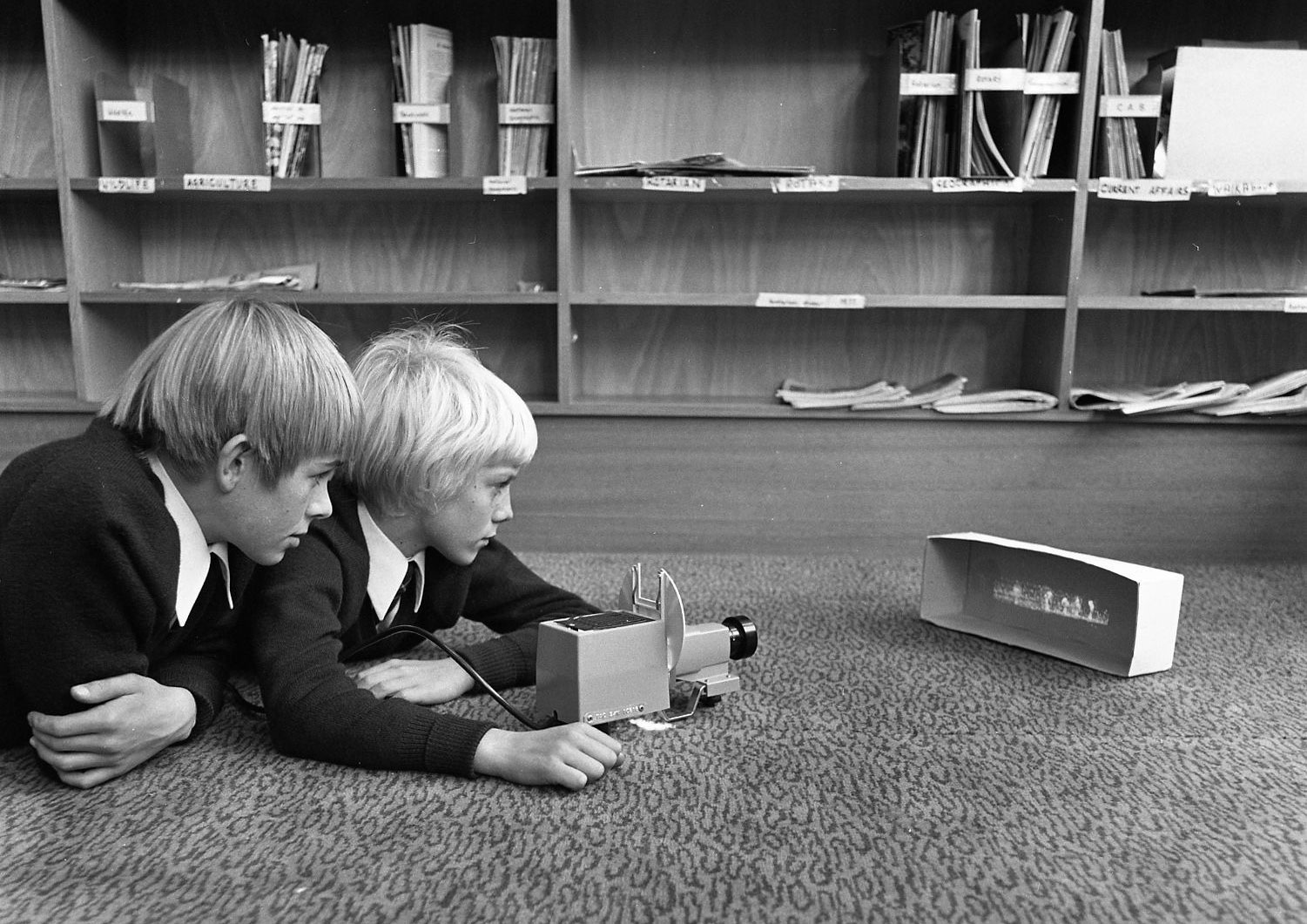
Students using projector in a Tasmanian school, 1951-1973. Source: Tasmanian Archive
Today’s students have been in contact with technologies since their early childhood; they are what are known as digital natives. They have greater ease in understanding the basic functioning of devices and programming, but this does not mean that they have a better understanding of the digital framework within which today’s society is developing. It is more necessary than ever to defend humanistic education in association with new technologies, which allows an understanding of the digital environment and, in addition, helps to form citizens who are more critical and involved in society’s future development.
One of the major challenges facing education today is the need to make the transition from a society in which people are digitally illiterate or at best “digital immigrants”, to one in which citizens are habitual users of technology from early childhood onwards. From a very early age, new generations coexist with digital devices, which are commonly used in all kinds of tasks. These generations are made up of what we now call “digital natives”, a concept that Marc Prensky coined at the turn of the century to distinguish between those born after the proliferation of digital devices and communication networks, and previous generations.
What should we call these “new” students of today? Some refer to them as N-(for Net)-gen or D-(for digital)-gen. But the most useful designation I have found for them is Digital Natives. Our students today are all “native speakers” of the digital language of computers, video games, and the Internet.Marc Prensky
This distinction can be useful to refer to the generational conflict between digital natives and digital immigrants, and to explore the differences that arise from daily coexistence with digital devices and software. But it cannot be extrapolated to the field of computer skills, and even less so to the understanding of the digital ecosystem. Prensky came up with the term “digital natives” as part of the debate on the shortcomings of the US educational system when it came to addressing the needs of digitally savvy younger generations. But in his original article (Marc Prensky, “Digital Natives, Digital Immigrants”, in On the Horizon (MCB University Press, Vol. 9 No. 5 October, 2001), Prensky already endowed digital natives with an advanced capacity to understand and to use digital technologies that, in practice, they do not appear to have.
Digital natives have a good basic grasp of how devices and software work, but they find it just as difficult as older generations to understand how the social ecosystem works. Somebody has to give them the means to understand the digital framework in which contemporary society plays out. If we equip them with these means to understand in a context that encourages them to create their own mindmaps, we will, in turn, create citizens who are more critical and actively involved in the future of society.
For too long, we’ve assumed that the passing of time would solve the educational problems arising from the need to adapt to the digital environment. We have assumed that as digital natives filled our classrooms, they would trigger the required change in teaching strategies. But as Sue Bennett, Karl Maton, and Lisa Kervin point out in The ‘digital natives’ debate: A critical review of the evidence, no study has shown that digital natives are a priori more competent in the use of technology: the level of skill is based on a person’s natural ability, education, and experience, not on their date of birth. We have to, at the very least, relativise the widespread idea that digital natives are inherently in possession of more sophisticated knowledge and a higher capacity to use information technologies.
A clear example of our neglect when it comes to generating knowledge around the framework in which digital technologies play out is the fact that there are no related subjects in the school curriculum. Education around technology is still elementary, focusing purely on practical skills and not on understanding how it works. Progress has been made in some areas, with the introduction of basic notions of programming and systems management, but always with a functional focus, without the analysis and reflection required to generate sustainable knowledge of the digital environment.
The Internet Universe Educational Briefcase is a pedagogical tool f developed by CCCB Education and CCCB Lab. It is designed to take knowledge and reflections about the impact of the Internet on our lives into the classroom.
Given that digital natives will not find solutions just by virtue of having being born during or after the eighties, we need to ensure that knowledge about the digital ecosystem and its cultural impact is included in educational programmes and becomes part of the social imaginary. This will allow digital natives to develop a relational theoretical discourse that is less linked to particular types of popular software and more adaptable to a changing environment. The main shortcoming in the education of new generations is the philosophical perspective: not academic philosophy disconnected from people’s lives, or philosophy that seeks to come up with systemic theories that are unsustainable in an ever-changing digital world, but a kind of philosophy that is the only truly practical path to “digital existence”.
Laving aside science-fiction scenarios, even though we have already embarked on the path to the fusion of man and machine, the fact is that a fulfilling digital life involves non-traumatic coexistence with the information environment, and being able to use and adapt to digital tools well enough to be confident and effective in spite of their evolution. Digital natives need to learn to respond to the ethical and philosophical problems arising from digital technologies, in order to build a society that is ethically active and aware of the guarantees necessary to defend citizen rights and freedoms.
In a world in which advances in biotechnology and nanorobotics challenge basic human characteristics, it is increasingly necessary to advocate a humanist education around the issue of new technologies, so as to ensure that citizens can actively and knowledgeably participate in debates that determine the evolution of society. We have to equip students with the means to understand the social impact of technology on the values that underpin the social contract, to allow them to defend the guarantees of reciprocity in that contract. Digital media develop in a dynamic, complex environment: we can only understand the way they work if we reflect and specifically pay attention to the principles of new technologies.
Understanding the fundamental concepts that structure digital culture, and the way they interact, is necessary in order to achieve peaceful coexistence with new technologies and fulfilling lives. And the same can be said for understanding the competent use of digital tools in a world in which digital illiteracy increasingly equates to functional illiteracy. The inherent dynamism of new technology cannot lead us to design an educational strategy based only on content and competencies, where students are taught to use digital tools but not to understand how they work.
There has never been a cultural experience comparable to today’s adoption of digital technology on a mass scale. As a result, for many years we placed our hopes for the full adaptation of individuals to digital society on the generational changeover, trusting that it would automatically result in the adoption of the new model as a modern type of natural ecosystem. But the reality did not live up to this naive prediction: today, young people’s ability to understand the digital environment varies greatly, due to their inadequate education in the constitution of digital culture.
The skills-based focus in education appears to be designed for an environment in which software and devices don’t change, and where they can be taught progressively, with increasing levels of difficulty. Students gradually become proficient in the use of a particular word processing software as they use it. But this does not mean that they gradually understand how it works, or that they can maintain the same level of proficiency when a new version is released.
Education has to address the basic principles of technology, those that do not constantly change, and are still valid when new computer services, devices, or protocols radically change a given process. This needs to be addressed in the classroom, and also in informal educational environments, from early childhood education. Human intelligence allows us to fill the gaps in a relational map through experience, but it does not allow us to constantly come up with new theories to define the structure of the relations, a complex operation that requires research, reflection, debate, and a process of collective creation.






Jesus Adell | 14 November 2015
Em sembla un article – reflexió molt encertat que hauria de ser de lectura obligada a tots els qui es dediquen a la docència i, també, motiu de debat per als qui tenen responsabilitats en la confecció dels programaris de formació d’infants i joves.
Equip CCCB LAB | 15 November 2015
Gràcies!
Ignasi | 29 November 2015
Jo crec que quan la gent llegia llibres, no havien de saber com es fabricaven, ni per a conduir fa falta tenir un coneixement exhaustiu de la mecànica dels cotxes ni el seu significat simbòlic a la societat.
El concepte de nadiu digital està relacionat amb el contacte des dels primer anys amb aquestes tecnologies, i efectivament, aquest contacte no pot assegurar ni la competència ni la comprensió.
La educació, de moment, continua sent necessària i també les humanitats i les arts, STEAM, perquè la capacitat de reflexió ens fa humans i ens allunya, de moment, de les màquines.
GITIC | Pearltrees | 15 August 2016
[…] Nadius digitals: del mite a la realitat. Estudiants fent servir un projector en una escola de Tasmania, 1951-1973. Font: Tasmanian Archive Els estudiants d’avui dia han estat en contacte amb les tecnologies des dels primers estadis de la seva infantesa, són el que s’anomena nadius digitals. […]
Leave a comment